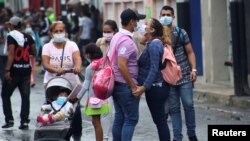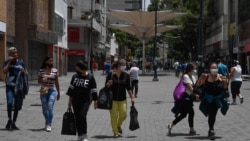On August 18, Venezuelan President Nicolás Maduro tweeted a video of Norkis Obispo, a member of the pro-government political organization Frente Francisco de Miranda (FFM), talking about her experience being treated for COVID-19 at the Dr. Egor Nucete Hospital.
In the video, Obispo says that she, in her role as an FFM member, has been involved in various activities to help the population deal with COVID-19, and that this is likely how she contracted the virus. She notes that she and other activists were getting COVID-19 tested weekly, and that she had tested positive for the virus five weeks earlier.
Obispo discusses her experience at the hospital where she was treated, saying she received the necessary care, including daily vitamins and medication, along with four quality meals a day.
Maduro accompanied the video with a message: "The simple and heartfelt testimony of Norkis Obispo, a warrior from the [Venezuelan] Plains recovered from the Coronavirus, thanks to the treatments, care and care of all health personnel.”
The video and the president’s message are misleading, and misrepresent how the coronavirus outbreak is impacting Venezuela.
Just two days after Maduro’s tweet, members of the nursing staff at Dr. Egor Nucete Hospital launched a sit-down strike. They refused to further treat COVID-19 positive patients until they were guaranteed proper biosafety equipment and supplies, along with “decent and optimal working conditions” to treat patients without putting themselves at risk.
"We do not have biosecurity equipment, in addition to this there is no water or medical supplies or medical equipment to protect our lives. All these conditions violate the rules and laws [of the country],” they said, citing “deplorable conditions” at the hospital.
Since the pandemic hit Venezuela, experts and international organizations have expressed concern over the effect it would have on its already-crippled healthcare system. As Polygraph.info reported in late June, Maduro has consistently downplayed the outbreak in Venezuela.
Alianza Rebelde Investiga (ARI), a Venezuelan news media collaborative, reported on June 7 that "hospital equipment, medical personnel and provision of basic services are insufficient” in the country’s 47 hospitals designated to treat coronavirus patients. Only 57 percent of the hospitals have a continuous water supply, and 43 percent have insufficient or no protective gear – such as gowns, surgical and face masks – for doctors and nurses. The investigation also found that only 15 ambulances were in operation for the entire hospital network.
Venezuela has relied heavily on humanitarian aid from allies like Turkey and China, and international organizations like the United Nations, to acquire PPE and other medical resources. However, such aid has not been sufficient to counter the consequences of a crippled infrastructure, power outages and a scarce water supply.
In the video, Obispo urges people to get tested if they have coronavirus symptoms, but widespread and reliable testing is also an issue in Venezuela.
Rafael Orihuela, a former Venezuelan minister of health, told the Voice of America that there are not enough labs for COVID-19 testing, even though more could be built (and were promised). “It seems that there is an attempt not to do so in order to keep [the figures] murky,” he said. “Currently, we have only one that is in Caracas where the test is done and it takes three weeks to deliver the results.”
During the last week, international media have reported on how Venezuela’s government is handling the pandemic, including deploying security forces and putting those who test positive in warehouses with sub-minimal living conditions.
The New York Times reported on Aug. 19 that Venezuelans who are returning to their country because of the pandemic – denounced as “bioterrorists" by Maduro – are being put into crowded rooms with limited protection, food and water, and "held under military guard for weeks or months for coronavirus tests or treatment with unproven medications.”
In cities like Maracaibo, the capital of Zulia state, police patrol streets looking for Venezuelans who returned home without official approval, the Times reported.
In early June, 20 people infected with the virus asked to be released from the University Hospital of Maracaibo because they had no food or water. The state's doctors’ association has decried a lack of hospital beds and supplies, use of low-budget hotels to quarantine coronavirus patients and the limited use of face masks.
Bloomberg reported on August 24 that patients and doctors are avoiding being tested so as not to be sent to state-run quarantine centers. “Venezuela was already very short on medical staff. People are afraid. Now patients arrive immediately needing intensive care because they lived with the disease at home until they just couldn’t any longer,” Maria Graciela Lopez, head of Venezuela’s Society of Infectology, told the news agency. Some people are relying on the black market for tests, so they are not monitored by the government.
On June 1, Maduro’s government and the opposition-led National Assembly, along with the Pan American Health Associations (PAHO), signed an agreement committing to work together to respond to the coronavirus outbreak. They also committed to create official channels for PAHO to help in fight the pandemic in Venezuela, by delivering assistance aimed at increasing diagnostic capacity, protecting health workers, responding to confirmed cases, increasing epidemiological surveillance and improving risk communication with the population.
According to the Johns Hopkins Coronavirus Resource Center, as of August 23, Venezuela had recorded a total of 39,564 COVID-19 cases and 329 deaths. Although the rate of daily new cases has decreased over the past week, experts warn that rates of infection are growing at a pace greater than the testing capacity. This is likely leading to an “artificial flattening of the contagion curve,” a lawmaker and medical adviser to opposition leader Juan Guaidó told Reuters.






